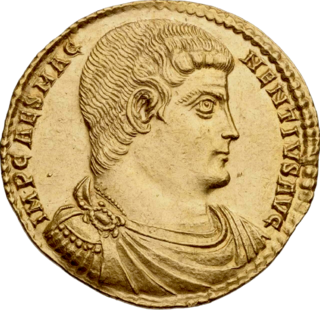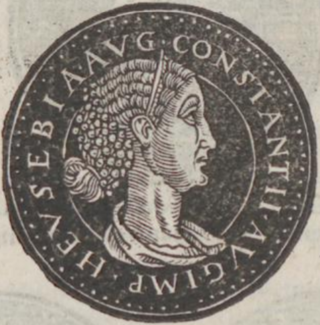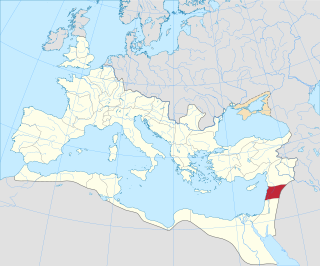Related Research Articles

Flavius Julius Constans, also called Constans I, was Roman emperor from 337 to 350. He held the imperial rank of caesar from 333, and was the youngest son of Constantine the Great.

Constantine II was Roman emperor from 337 to 340. The son of the emperor Constantine I, he was proclaimed caesar by his father shortly after his birth. He was associated with military victories over the Sarmatians, Alamanni and Goths during his career, for which he was granted a number of victory titles. He held the consulship four times – in 320, 321, 324, and 329.

Year 324 (CCCXXIV) was a leap year starting on Wednesday in the Julian calendar. At the time, it was known as the Year of the Consulship of Crispus and Constantinus. The denomination 324 for this year has been used since the early medieval period, when the Anno Domini calendar era became the prevalent method in Europe for naming years.

Magnus Magnentius was a Roman general and usurper against Constantius II. Of Germanic descent, Magnentius served with distinction in Gaul under the emperor Constans. On 18 January 350 Magnentius was acclaimed Augustus. Quickly killing the unpopular Constans, Magnentius gained control over most of the Western Empire. The Eastern emperor Constantius II, the brother of Constans, refused to acknowledge Magnentius' legitimacy and led a successful campaign against Magnentius. Ultimately, Magnentius' forces were scattered after the Battle of Mons Seleucus, and he died by suicide on 10 August 353.
Flavius Julius Constantius was a member of the Constantinian dynasty, being a son of Emperor Constantius Chlorus and his wife Flavia Maximiana Theodora, a younger half-brother of Emperor Constantine the Great and the father of Emperor Julian.

Martinian was Roman emperor from July to September 324. He was raised to the purple by the emperor Licinius, whom he had hitherto served as a senior bureaucrat, during Licinius's civil war against the emperor Constantine I. Constantine defeated both emperors and forced them to abdicate, and executed them after initially showing leniency.
Calocaerus was a Roman usurper against Emperor Constantine I, who, in 334 AD, staged a short lived revolt in Cyprus. His revolt was quickly put down, and he was executed along with his commanders, by being burned alive.

Eusebia was Roman empress as the second wife of Roman emperor Constantius II. The main sources for the knowledge about her life are Julian's panegyric "Speech of Thanks to the Empress Eusebia", as well as several remarks by the historian Ammianus Marcellinus.

Licinius II, also called Licinius Junior or Licinius Caesar, was the son of the Roman emperor Licinius I. He held the imperial rank of caesar between March 317 and September 324, while his father was augustus, and he was twice Roman consul. After losing a civil war, his father lost power and both he and Licinius Junior were eventually put to death.
Valerius Maximus was a Roman senator.
Galla was the first known wife of Julius Constantius, a member of the Constantinian dynasty.
Julius Julianus was a Roman politician, the grandfather and namesake of the future emperor Julian.
Aristaenetus was a Roman politician who was appointed consul in AD 404 alongside the western emperor Honorius.
Flavius Eusebius was a Roman Senator, who was the brother-in-law of the emperor Constantius II.
Titus Claudius Aurelius Aristobulus was a Roman soldier and politician who served as consul in 285 AD. He served two emperors, Carinus and Diocletian.
Ulpius Limenius was a Roman politician who was appointed consul in AD 349.
Titus Flavius Postumius Titianus was a Roman politician who served as senator and consul suffectus.
Seleucus also known as Flavius Seleucus and Count Seleucus was a wealthy Greek rhetor who was a close friend of Libanius and the Roman emperor Julian.

Phoenice was a province of the Roman Empire, encompassing the historical region of Phoenicia. It was officially created in 194 AD and after c. 392, Phoenice Syria was divided into Phoenice proper or Phoenice Paralia, and Phoenice Libanensis, a division that persisted until the region was conquered by the Muslim Arabs in the 630s.
(Flavius) Hermogenes was a Roman senator who served in various civilian offices from the reign of Licinius through to Constantius II.